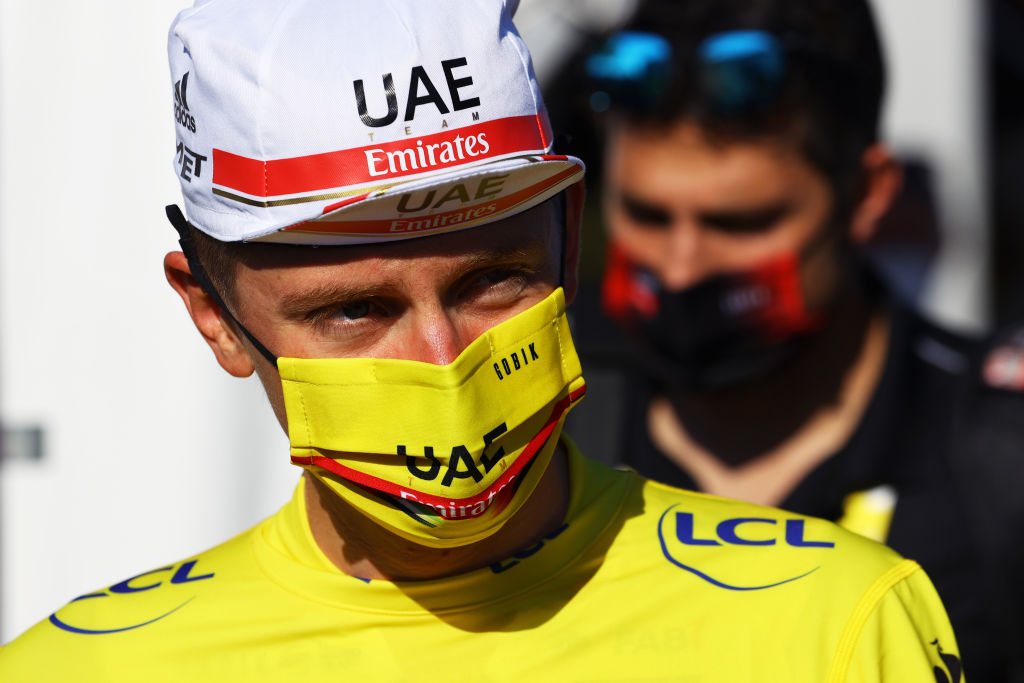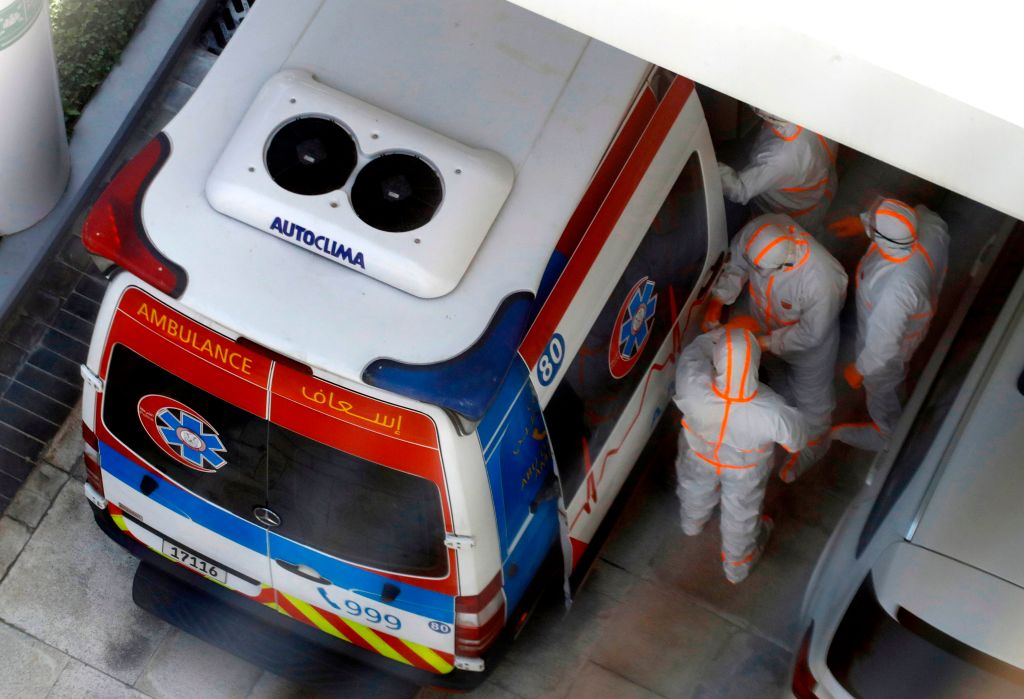UAE Team Emirates taking no chances with COVID-19
Team doctors reveal entire team is vaccinated

As professional cycling begins its third season of racing amid the COVID-19 pandemic, with yet another surge in cases due to the omicron variant, Tour de France winner Tadej Pogačar and his Team UAE Emirates, are taking no chances with the virus.
The team's head of performance, Dr. Iñigo San Millán told Cyclingnews that all of the team have been 'fully' vaccinated and are ready to comply with the new UCI 'Health Pass'.
Most teams gathered in large groups in December and January for their training camps, but several teams admitted to detecting COVID-19 positives. The Jumbo-Visma team of Pogačar's rival Primož Roglič had to break up its camp early because of one, and AG2R-Citroën and Sport Vlaanderen Baloise were also hit by cases. Pre-travel testing, daily testing, the creation of small training groups and basic precautions helped limit case numbers.
UAE Team Emirates made it through their camp unscathed by COVID-19 even though they trained in the same part of Spain as Jumbo-Visma, something that San Millán was both surprised by but proud of because the team took careful steps to avoid infections.
"We were in Spain at training camp with 70-80 people for 12 days, every three days we were getting antigen tests and had not one single case. Omicron was everywhere and I thought it'd be a mess," San Millán tells Cyclingnews.
That they had no positives he says, "was amazing".
"The protocols for the team have been pretty strict - they had to have a negative test before even entering the hotel, wear masks at all times, and stay in the bubble - no leaving the hotel. We were also the only guests in the hotel and the staff has been fantastic, so we had a lot of mitigation. Maybe in a bigger hotel with more guests, it was more difficult to control."
The latest race content, interviews, features, reviews and expert buying guides, direct to your inbox!
The example set by UAE Team Emirates, with high vaccination and low infection rates, is a goal any group would be proud of but it also reflects a wider success in cycling. By the end of 2021, the UCI says 82.5 per cent of team members have been vaccinated, there has been a "very low positivity rate" in testing and although about 20 per cent of team members experienced a COVID positive, there were no hospitalisations or long-haul COVID cases.
With countries like France requiring vaccination and others enforcing COVID-19 pass rules, the UCI enacting stringent rules, the vaccination rates have undoubtedly gone up even more.
"We really have to commend the UCI and world of cycling has done a fantastic job and been an example for the rest of the world," San Millán says.
Learning from 2020

UAE Team Emirates and many other WorldTeams arguably take the pandemic more seriously than other sports because cycling was one of the first sports hit by COVID-19 at the UAE Tour in February 2020.
UAE Team Emirates had several members contract the virus: Fernando Gaviria and Max Richeze were quarantined for weeks in the UAE with 'very mild' cases, and Dario Marini, the team's osteopath - a healthy 38-year-old triathlete - spent nine days in the ICU with severe pneumonia and feared for his life.
San Millán was there, watching from the hotel where the race entourage was confined, seeing team members who tested positive being led away to quarantine by people in Hazmat suits. The whole ordeal was traumatic.
The risk of an illness disrupting the season and the team's brush with COVID-19 in 2020 made them one of the earliest adopters of vaccination against it. UAE Team Emirates were given a COVID-19 vaccine during training camp in in the UAE in January 2021. Riders received the Sinopharm vaccine, one made with the traditional method using an attenuated version of the virus, but then followed with a course of newer inoculations. All of the team have since had follow-up shots with one of the vaccines that are accepted in the European Union, as requested for the UCI's Health Pass.
As a researcher who studies mRNA approaches to treating cancer, he disavows conspiracy theories surrounding the safety of these vaccines and says riders should not be afraid of the shot harming their performance.
"Most people feel a little off for a day or two," he says, adding that the risks of getting the virus are far worse. UAE Team Emirates carefully timed riders' shots around important periods to avoid disrupting their training or racing.
"We've been working around riders' schedules. Some got [vaccinated] right after the Tour de France or Giro d'Italia when they've had a 15-day period of rest. Now in the off-season, a lot of professional cyclists have either gotten the vaccine or the booster because they (have less worry about side effects)."
By all accounts, UAE Team Emirates' approach has worked out: Pogačar won the Tour de France by more than five minutes on his nearest competitor, took a bronze medal in the Olympic Games, won two Monuments - Liège-Bastogne-Liège and Il Lombardia - in addition to overall victories in the UAE Tour, Tirreno-Adriatico and Tour of Slovenia.
It wasn't just Pogačar finding success, either. Joe Dombrowski won a stage of the Giro, Rafal Majka won a stage of the Vuelta a España, and Ryan Gibbons, Juan Sebastian Molano, and Diego Ulissi scored multiple victories. The team ended the season fourth in the UCI World Rankings.
Risks of infection
Worldwide, the rate of vaccination against COVID has approached 50 per cent but the new omicron variant is spreading like wildfire through even the most inoculated regions. Most European countries are over 70 per cent vaccinated but cases are still rising. Vaccines appear to reduce the severity of infection but studies are mixed on whether they reduce the rate of lasting symptoms, the much-feared 'long-COVID'.
San Millán says that while very rare, long-COVID could be career-ending. He was part of a group that studied COVID long-haulers, some of whom had typical cases of the disease that did not require hospitalisation but led to long-lasting health problems.
Some of the symptoms indicated a decrease of mitochondrial function. Mitochondria are the body's cellular engine and fuel athletic performance. Even if the chance of getting long-COVID are rare, especially if you're vaccinated, the effects can be devastating.
"This is a very bad virus," San Millán says. "It attacks many organs in the body, one of those is the heart. It's not just the lungs, it can attack muscles, the brain.
"If you're not protected, becoming a long-hauler like this would be a career-ending event. Even the mild long-haulers aren't working well for months. It might ruin your whole season, it might affect your career if you're finalizing a contract. It's important to be well protected."
Although UAE Team Emirates had some of the earliest COVID cases in the peloton, it has not had an effect on the riders' abilities. Richeze and Gaviria had 'very mild' and no long-term effects.
"We've been looking into it with power numbers and training capabilities and we haven't seen any effects. But again, in our study, 25 per cent of the (long-haulers) were healthy, had no comorbidities, they had a normal course of COVID. They were Colorado people who were active, doing marathons, triathlons, now they can't go up the stairs, They're exhausted after six months. We're seeing that even very healthy populations can see these severe, long-lasting effects," he says.
A November 2021 study of college-aged athletes showed that symptoms lingering for more than three weeks were rare in that population - but not zero - and four per cent had symptoms such as chest pain, shortness of breath or heart palpitations upon exertion.
That pro cyclists have avoided long-haul COVID, he says, is lucky.
"We've seen in other sportspeople not getting back to normal after weeks or months. We haven't heard of this in any WorldTour teams but we've been lucky."

Laura Weislo has been with Cyclingnews since 2006 after making a switch from a career in science. As Managing Editor, she coordinates coverage for North American events and global news. As former elite-level road racer who dabbled in cyclo-cross and track, Laura has a passion for all three disciplines. When not working she likes to go camping and explore lesser traveled roads, paths and gravel tracks. Laura specialises in covering doping, anti-doping, UCI governance and performing data analysis.